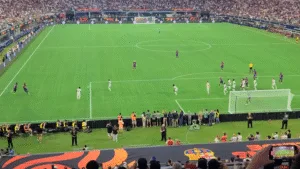Some football matches fade from memory almost as soon as the whistle blows. El Clásico is not one of them. Real Madrid vs FC Barcelona has never existed as just a contest of goals; it is a clash of philosophies, a spotlight on identity, a grand emotional currency spent loudly in front of the world. You don’t simply “watch” this fixture — you live inside it for ninety minutes. The stadium roars, screens glow, families gather, and entire cities feel suspended in a rare and collective heartbeat.
Tonight, as Real Madrid host Barcelona at the Santiago Bernabéu, the energy feels unusually heightened. There is youth, there is reinvention, there is generational handover taking place right in front of us. The match has the tone of renewal — not simply another chapter, but the re-inking of the rivalry’s future. The players on the pitch aren’t merely participating; they are inheriting a cultural responsibility.

✅ EL CLÁSICO – MATCH FACTS (WordPress Ready)
| Category | Details |
|---|---|
| Fixture | Real Madrid vs FC Barcelona |
| Competition | La Liga 2025/26 |
| Date | 26 October 2025 |
| Venue | Santiago Bernabéu Stadium, Madrid |
| Kickoff Time | 15:15 CET |
| Live Score (as of last update) | Real Madrid 2 – 1 Barcelona |
| Managers | Real Madrid: Xabi Alonso • Barcelona: Hansi Flick |
| Key Star Players | Mbappé, Vinícius Jr, Yamal, Pedri |
| Tactical Identity | Madrid: vertical pressing & transitions • Barça: positional play & controlled possession |
| Last Five Meetings | W2 (Madrid), D1, W2 (Barça) |
| Official Reference Link | https://www.bbc.com/sport/football/live |
Once the whistle goes, you immediately feel a difference in tempo: Madrid are not just attacking — they are accelerating. Their forward line is bursting forward like a sprint relay, using pace as a weapon rather than decoration. The early sequences look handcrafted, as though drilled in a strategic laboratory rather than improvised under pressure. By integrating AI-driven match tracking into their tactical preparation, the squad seems able to anticipate transitions milliseconds faster than before. The system almost looks like chess, played at a sprint.
Barcelona, in contrast, are sculpting their football in passages. Their possession isn’t only a way to move the ball up the pitch; it is a way to slow the breath of the match and reclaim narrative control. The midfield rotations are quieter, more traditional, rooted in memory and rhythm. There is something poetic in watching young players carry old identity — like inheriting the blueprint of a cathedral and renovating room by room, carefully but defiantly.
It is striking to see how each club is evolving while still protecting its soul. Madrid play with a modern explosiveness built on dual-speed transitions. Barcelona are trying to preserve the conceptual purity of positional football while retrofitting it with youthful dynamism. Two ideas, two identities, both alive inside the same 105 meters of grass.
But the beauty of El Clásico is that tactics, while fascinating, are never the whole story. This is also emotional landscape. The noise feels heavier, the eyes more focused, the misses sharper, the goals louder. Fans don’t merely cheer; they bear witness. Every generation discovers the rivalry in its own emotional language — grandparents talk about Di Stéfano, parents still debate Messi and Cristiano, and now children obsess over Mbappé versus Lamine Yamal.
There is also a cultural gravity here that is difficult to replicate in sport. Global broadcasters rely on this match to anchor their calendars. Football economies feel its ripple. Players know legacies hinge on performances like this — not in May’s summary, but in October’s memory. Even neutral fans confess that El Clásico lives in its own emotional postcode.
What makes tonight especially compelling is that we are watching a rivalry in transition, neither frozen in nostalgia nor rushing toward reinvention. Madrid are discovering how to modernize without losing drama. Barcelona are rediscovering how to defend beauty while still surviving battles. The duel becomes symbolic, not just statistical.
By full-time, there will be a winner on paper — but in the mythology of football, both clubs keep enlarging the rivalry’s footprint. Every classic adds handwriting to a decades-long manuscript. The energy tonight confirms something essential: this isn’t Spain’s derby; this is football’s common inheritance. A story lived again and again, reborn every time the ball rolls.
